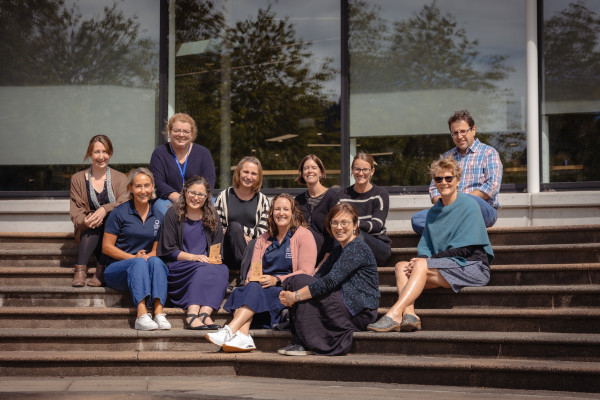- Tūhono home Hoki ki Tūhono
-
- Staff Directory
- Chief Executive Office Auckland International Office Corporate Services Finance Campus Services Functions and Catering Information Systems and Support Marketing, Communications and Engagement Learner Journey Academic Registry International Learner Services Te Punaka Ōwheo
- Learner Experience Academic Excellence Central Campus College of Community Development and Personal Wellbeing College of Engineering, Construction and Living Sciences College of Health College of Work Based Learning Open Education Resource/OERu Research and Postgraduate Studies Te Maru Pumanawa | College of Creative Practice and Enterprise
- Māori Development and Kaitohutohu Office People, Culture & Safety People and Culture Childcare Centre Te Ama Ako | Learning and Teaching Development Wellbeing and Safety Auckland Staff Directory Executive Office Academic Corporate Services Marketing and Business Development Human Resources Campus Quality and Programme Development
-
 Our people make a better world
Our people make a better world
We build the capabilities of individuals, organisations and communities and help them to realise their potential.
Staff Directory
-
- Tools
- Academic Integrity Declaration Form AIC Applications Dashboard Approved Programmes Approved Programme Fees Centralised Assessement Repository Chemwatch CMS - Tūhono & StudentHub updates Course Evaluation and Surveys CRM Applications CRM customer service hub Delegations policy/process Disability and Neurodiversity Dynamics 365 (CRM) EBS Ontrack EBS Report Email Security Personal Portal Employment Matters / Solarworkplace / Performance Reviews eTaxi eTV
- Financial Variance Reporting Hidden Disabilities Sunflower programme FCM travel intranet InPlace International entry requirements Knowledgebase articles Learner Capability Learner Support Dashboards Linkedin Learning Log a job with Marketing Login as an applicant Microsoft 365 Moderation App Moodle OP Docs OP Docs - Publishing OP Image Libraries Performance Excellence Portal Product Evaluation Panel
- Policy Library Privacy Programme and Course Design and Development Qualtrics XM RDS Remote Access Support Portal Research Database Robertson Library Staff FAQs about Graduation Status of Programmes Student Hub (Kāpehu demonstration view) Study Abroad info for learners Tūhauora I Wellbeing resources Uniprint Vault Webexpenses Auckland Tools
-
 Vault
Had an accident or near miss?
Log it here
Vault
Had an accident or near miss?
Log it here
-
- Communities
- Community AI Steering Committee Ally Network EBS Community of Interest EdTech Champions Health & Wellbeing Research Internal Evaluation Neurodiversity Professional Team Professoriate Proud@OP Student Support Website Advisory Group Web Champions Working under the Rainbow Project Learner Capability Trade Training Centre
- Committee Academic Committee Animals@OP Diversity and Equity Doctor of Professional Practice Committee Kaunihera Whakahaere - Leadership Council Internal Evaluation Learning & Teaching Leadership Team Library Committee Mental Health and Wellbeing Advisory Group Otago Polytechnic Board of Directors Pastoral Care Code Committee Programme Approvals Committee Research and Postgraduate Committee Research Ethics Committee Staff Subcommittee
- Think Tanks Mātauraka Our learners achieve educational success Pūtea Our financial success Tākata Our people, our team, our community Tiriti Our active commitment as a Treaty partner Tūroa Our commitment to be a sustainable and responsive organisation
-
 Create a community
Create a community
Do you have a community, committee or project that you'd like represented here?
Communities
-
- About OP
- Keep up to date All news All events All notices All blogs Share your info Create a news article Create an event Create a notice Create a blog
- Community and Partnerships Alumni and friends Education Foundation Operational information Academic calendar 2025 Academic calendar 2026 Current vacancies Dunedin campus map Our policies Topical FAQs
- Who we are Commemorative sites Māori Strategic Framework Our history Our strategic priorities Pasifika Strategic Framework (2025-2030) Vision and Values Working for us OP job opportunities Wellbeing Calendar Working at OP
-
New Zealand: 0800 762 786
contact us
International: +64 3 477 3014
Unpicking the blanket: Escaping the bed we were made to lie in
Author: Lissie Brown
Supervisors: Jane Venis Michele Beevors
Brown, L. (2023). Unpicking the blanket: Escaping the bed we were made to lie in. (Master's dissertation, Dunedin School of Art, Otago Polytechnic | Te Pūkenga - New Zealand Institute of Skills and Technology). Research Bank. https://doi.org/10.34074/thes.6132
Abstract
This project focuses on the complexities of womanhood by addressing both physical and psychological aspects of being female. Generational associations between women became the basis for my research as they are instrumental in shaping our beliefs around what it means to be a woman with each generation unwittingly throwing a blanket of their experiences onto the next. It is important to acknowledge that we carry forward ripples from the past, while also being informed by events and opinions specific to our own time. While we must look through the lens of things, it is vital that we also look between things, questioning why we have these connections and what purpose they serve.
Working within an auto-ethnographic methodology the personal relationship between myself and my mother provided an intimate account of the complexity of the mother daughter relationship, with particular focus on the period post World War II up to the present day. Investigation into the perceived role of women not only as mothers and daughters but as active participants within society, provides insight into the double standards that still exist in relation to gender equality.
Examining how society has stitched womanhood together, it became evident that humanity continues to look at woman and womanhood through a narrow lenses that is steeped in gender bias. Cultural constructs of Western patriarchal society and feminist action both continue to shape women’s lives and the use of subtle manipulation and control is so ingrained in our cultural norms that it regularly goes unnoticed. Consistently repeating patterns, failure to consider alternatives, trying to ‘fit in’ and ‘do the right thing’, as perceived by generations older than us, are common traps to fall into. The impact on our external and internal being is monumental and often goes unacknowledged and unrecognised.
Womanhood is no longer confined to the domain of the domestic environment and their role as active participants in contemporary society provides platforms for initiating great change. I believe we are in an era of disruption and am attempting to highlight the patterns of the past and the need to challenge our behaviours and ways of thinking as we step into the future. The time is ripe for new beginnings, where women do not simply participate in the world as it already exists, but actively attempt to re shape it.1 Acknowledging the fundamental characteristics and traits of women, from the matriarchal perspective rather than the traditionally accepted patriarchal viewpoint.
1. Crispin Jessa, Why I am Not A Feminist, A Feminist Manifesto. New York; Melville House Printing 2017, xi.
- See images of Lissie's work on Flickr
Keywords
womanhood, matriarchal, women, feminism, female, generational
License
A redacted version of the dissertation is publicly available under a Creative Commons Attribution Non-Commercial No Derivatives licence CC BY-NC-ND 4.0 International![]()